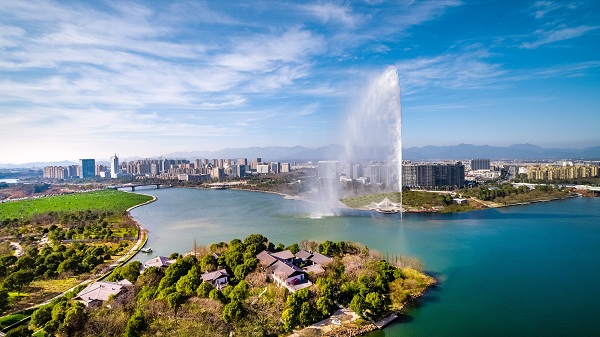This is Quzhou

Xin'an Lake scenery in Quzhou, Zhejiang province [Photo provided to chinadaily.com.cn]
Population: 2,578,800 registered residents (2018); 2,209,000 permanent residents (2018)
Location: west of Zhejiang province in the upper reaches of the Qiantang River, bordering Fujian, Jiangxi and Anhui provinces
Area: 8,844.6 square kilometers
Economy:
Since the city was established in 1985, Quzhou has witnessed tremendous economic improvement.
In 2018, the city's GDP reached 147.06 billion yuan ($21.34 billion), an increase of 7.2 percent year-on-year. Quzhou's primary, secondary and tertiary industries contributed added value of 8.09, 66.17 and 72.80 billion yuan, up by 2.3 percent, 8.2 percent and 7.0 percent respectively. The ratio of the three industries is at 5.5:45.0:49.5. The general public budget revenue was 12.81 billion yuan.
With a focus on digital and smart industries, the city has attracted many major firms in the internet industry, including Alibaba, ZTE, NETEASE and DAS-security. It will maintain its growth momentum through innovation.
Administrative divisions:
Quzhou governs two districts – Kecheng and Qujiang, three counties – Longyou, Changshan and Kaihua, and one county-level city – Jiangshan.
Brief introduction:
A nationally renowned historical and cultural city, Quzhou was built in the Eastern Han Dynasty (25-220). It was one of the best-persevered State-level cities in ancient times in Jiangnan (south of the Yangtze River), and cultural relics (units) under State protection, as evidenced by its rebuilding of the Wenchang Pavilion and the Tianwang Pagoda.
Considered the dwelling place of Confucius's descendant in southern China, Quzhou is home to Confucius' South Zen Ancestral Temple, one of the only two Confucius ancestral temples in China. The Qingyang village in Jiangshan, Quzhou's county-level city, is acknowledged as Chairman Mao Zedong's ancestral home by the National Archives Administration of China. Quzhou's Lanke Mountain is the legendary birthplace of Weiqi (the game of Go).
Quzhou has the honorary titles of State-level ecological demonstration zone, national garden city and national forest city. Its forest coverage has reached 71.5 percent. It received its title as the "top ten livable city in China" for two consecutive years and ranks fourth on the list of "China's Happy Cities".
